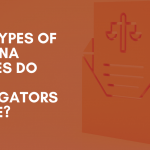People hire private investigators to do detective work, to investigate an event, incident or crime. They can work either for a private investigation agency, for corporations or on their own. Examples of companies that might hire a private investigator include, law firms and insurance companies. Respectively these entities may collaborate with them in the court of law, or hire them to look into potentially fraudulent claims. Different jobs such as these often require different specialities. So it is common for private investigators so specialize in particular types of cases or practices.
Some of the avenues of speciality a PI may undergo can include: forensic accounting, compiling evidence and forensic computer investigation. Among all of these specialities, howver, there is one predominant thing they all have in common. The most important facet of a private investigator’s job entails gathering information and facts. There are many ways to go about this, and in this article we will endeavour to explain some of these to you.
What are Some of the Duties Private Investigators Perform?

Being a private invesetigator requires a wideset of skills, whether specializing in a particular aspect of investigation or not. Below are some of their most common responsibilities:
- Reports
- Background checks
- Surveillance
- Interviewing witnesses
- Locating missing persons or suspects
- Expert witness testimonies
- Database checks
- Evidence compilation for presentation at court
Even though private investigators are not government agents, and don’t hold the same authority as a police officer, any legally acquired information a PI collects can be used for evidence in court and in criminal investigations. This is the predominant reason it is so important for private investigators and police detectives to stick to a particular modus operandi when looking for evidence. If stricts rules and regulations are not followed, not only could the evidence become impermissible in court, acquiring it in this way could also be illegal.
Other General Skills PIs Have
- Analysis of EVidence: Evaluating, interpreting and analyzing evidence is an important part of a PIs job. These skills are what can determine whether the right piece of evidence is submitted to course. This can mean the difference between winning or losing a case.
- Having a strong sense of integrity and curiosity can make all the difference in a PI’s career.
- Problem-solving. What else are cases if not one big problem to solve? The very act of finding and compiling evidence is by definition a problem to solve. Successful PIs think on their feet, and make decisions based on their knowledge of the law.
- Communication skills. Almost all jobs require competency in interpersonal relations and communication. However, being a private investigator asks more of this set of skills. It is important for them to make people feel safe, to earn people’s trust so as to perform their job properly. Interviewing witnesses, for example, is a very delicate part of the process that requires tact and solid communication skills.

If you find yourself in need of a licensed private investigator and their particular set of skills, please feel free to call us. Or simply click on this link to get in contact with one of our team members.










